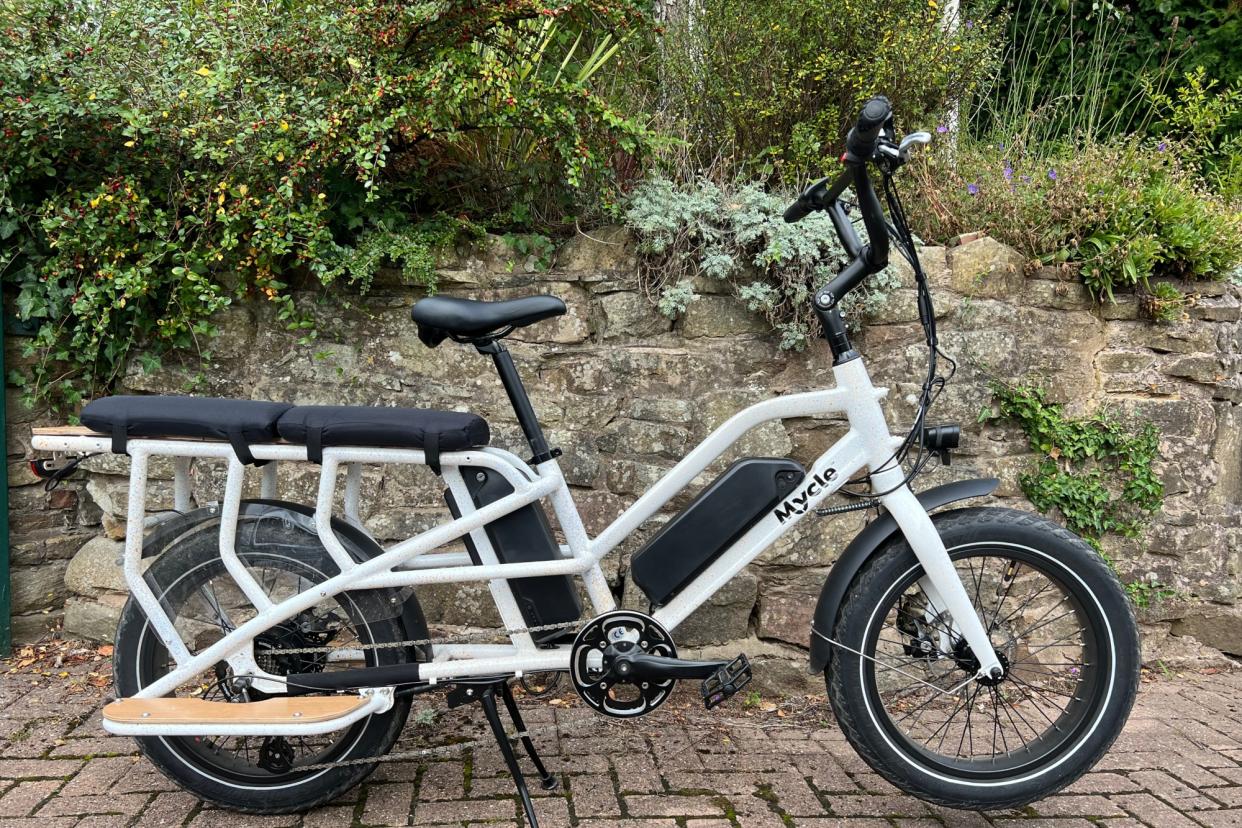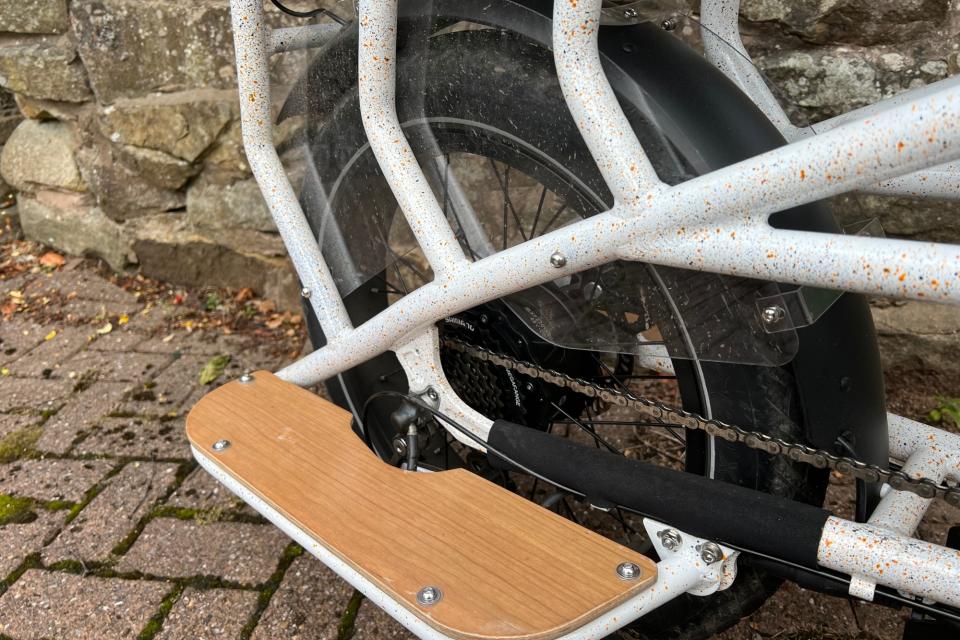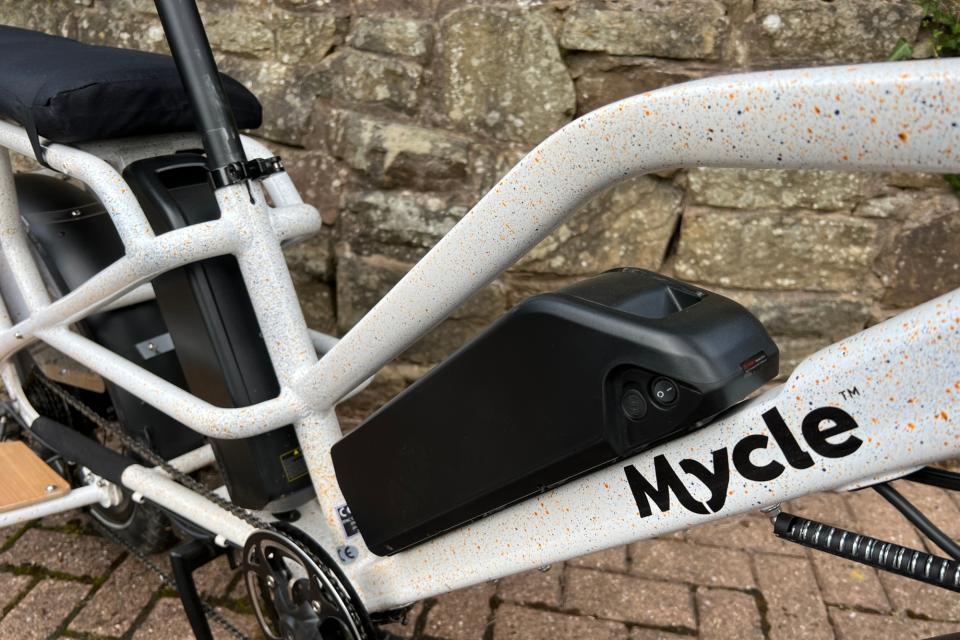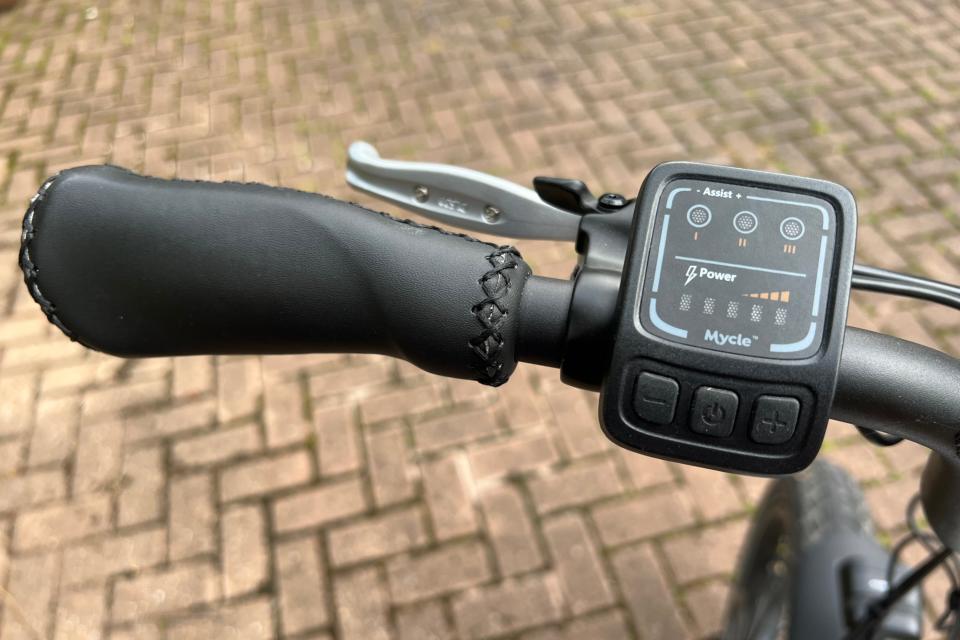Mycle Cargo Electric bike review: heavy-duty haulage at a highly accessible price

Ask anyone about getting a cargo bike and the two biggest blockers would undoubtedly be the price of one and living somewhere too hilly to use it.
Hopping on any of the best electric cargo bikes will instantly demystify the issue of hills. However it's down to the Mycle Cargo Electric bike to smash the entry price point, to remarkably less than £2k.
Mycle Cargo Electric bike - Construction
The long-tail design of the Mycle Cargo Electric bike may look similar to other cargo bikes that carry the load out back, but as I said in the Tern GSD S10 Cargo bike review, each design really is bespoke to each brand.
The Mycle measures 1,870mm length in total, with a wheelbase of, by my own measuring, around 1350mm. Comparing this with the long-tail Tern GSD, it's 50mm longer, which in theory would give it a little more stability.
Comparing this with a regular road bike, such as the Specialized Roubaix, one of the best endurance bikes, which has a wheelbase of around 987mm (for a size 54), you get a good idea as to how long Mycle Cargo Electric bike is.

Being constructed from 6061 aluminium isn't anything new. It's a popular frame material, but opting for this over steel has helped keep the overall bike weight down, to a claimed 36.6kg (for the two-battery 120km model). However, in needing to keep the overall bike's strength up to carrying a (claimed) total cargo load of 210kg, it does require the bike to have a fair amount of reinforcing. It's the same for all long-tail cargo bikes, but the stripped-back design of the Mycle, which doesn't have as many infill panels like the Tern GSD, does give it a utilitarian look.
In fact, I'd actually say it's pretty rudimentary in it's design, with cables banded together and the raw finish of the Perspex rear wheel guard.
As with most cargo bikes, it's a one-size-fits-all range. The minimum seat height is 750mm from the floor, and maximum seat height is 950mm, with a stand over height of 560mm as the bike sits on 20in wheels.
This almost mirrors that of the Tern GSD, but this time there is no handlebar adjustment, something to bear in mind if you are at either end of the saddle height spectrum.
Mycle Cargo Electric bike - Battery and motor
Just as important as the frame is the battery and motor. It's the one thing that all brands of the best electric bikes spend time specifying in order to balance out torque, power deployment, and capacity (speed v distance).
The Mycle Cargo Electric bike comes with a 60km 48V 15Ah LG Battery 21700 cell, or two of them if, like our test model, you choose the 120km version. The battery does dictate the range of the bike, but don't get too hung up on the proposed distances.

As with any electric bike, the distance you get from a single charge will be massively impacted by speed, weight, terrain, weather conditions and even road surface. In general, after a few weeks with the bike you get an idea for your style of riding and what sort of distances you are likely to get from the battery.
Determining how fast/easy your ride is and the smoothness of power deployment is the job of the motor, which is controlled via the small button-operated unit on the handlebars, giving a choice between three power assists.
The folk at Mycle have opted for a 250W 48V brushless rear hub based motor. The anatomy of an e-bike motor and it's location is hotly debated, but locating the 65Nm of max torque motor in the rear hub can save the wear on drivetrain a little, as it's not the motor driving it as it would be if it was located at the bottom bracket.
Splitting the electronics like this does give the batteries a rather strapped-on look, as opposed to an integrated/hidden design. This shouldn't really affect performance, just aesthetically it's not as clean looking as other electric models, but again it's about compromises when hitting a price point.
Mycle Cargo Electric bike - set-up
Although perhaps not as much of a deal breaker as a non-power assisted regular bike, the spec of a cargo bike is still worth taking in to consideration, especially when it comes to brakes and contact points.
As with anything that has been designed to come in at a specific price point, there need to be some compromises, and along with the battery and motor not being from a known brand, the spec of the Mycle Cargo Electric bike is also cost saving.
The most obvious is that it comes with mechanical disc brakes over hydraulic. It's clearly an area that Mycle have thought long and hard over, as stopping a potential mass of 210kg travelling at speed isn't something you want to 'make do' with. I admire the brand's confidence that the Tektro Mechanical Disc Brakes are up to the job, as I think it is one of the few brands that has deviated from hydraulic.

Interestingly it has teamed these with highly durable and quality Shimano seven-speed Altus cassette and shifters, alluding to a well-thought-out cost saving concept. as Mycle could have just opted for a no-brand here, leaving the customer to foot the bill for replacing worn parts sooner.
The other departure from more expensive brands is the lack of suspension, on forks or otherwise, something to consider when factoring in the terrain of your regular rides. That said the 3in anti-puncture tyres will go a long way in soaking up some road buzz due to their large volume.
Other contact points are where further price point compromises have been required, with a no brand saddle being specced, and grips on the handlebars a rather curious stitched faux leather.
While an inbuilt lock for the whole bike would be ideal, it's good to see that batteries are lockable to the bike.
It's also really great to see integrated lights, meaning one less thing to remember to bring when out and about on the bike.
Mycle Cargo Electric bike - Cargo set up
Like frame design, the other bespoke cargo bike brand feature is the cargo set-up. The Mycle Cargo Electric cargo bike keeps it simple with a long board out back, passenger cushion and footboards. There is, of course a wealth of optional extras to personalise your ride, including child seats, baskets, bags and passenger handles.
Mycle Cargo Electric bike - the ride
If you've read any of my previous reviews, you will be bored by my tales of woe for living in such a hilly location in south Manchester. The beauty of the semi-rural village is undeniable, but very much in the foothills of the Peak District, even our local canal towpath requires a dismount and push-up in order to navigate it.
This also makes it the perfect testbed for electric cargo bikes and discovering where the limit is which, after three months of riding, I'm still to find on the Mycle Cargo Electric.
It's been a whole family affair. It's carried shopping, an eight year old, and even a 74 year old up some of the hilliest roads.
It's been brilliant to have this bike and the Tern GSD quite literally side by side for comparison. The biggest difference is in the speed and smoothness that the pedal assist kicks in between the bikes, and then the effort required to sustain the pace.
When compared to the Tern, which is equipped with the top-end Bosch Cargo Line battery and motor, the Mycle is nowhere near as quick to kick in, and is also quick to cut out when you stop pedalling.
It's a feature that you really need to be wary of, especially if stopping on a hill with a heavy cargo, eg a full grown adult. Remembering to swiftly change up to your smallest gear (biggest sprocket) will help, but sometimes it's only the dispatching of your load, some more understanding than others, that will get the cranks turning again.
However, unless you have come to a dead stop, should you gently turn a crank, say to pick the left hand pedal up when cornering in the same direction, it will kick back in at the same speed when you last turned the cranks.
In practice this delivers some very erratic riding speeds which, if I'm being honest, at first, felt slightly out of control. The more you ride the bike the more you get ready for the sudden propulsion forward, but it does take a while to get used to.
It's the same ride feel that the Volt Pulse LS e-bike delivers, and for some riders, the minimal input will be a big plus point. For me, however, I really struggled with this lack of control of speed moderation via the pedals. The ride feel is very distant from the ride feel of a regular bike, pushing it more into moped-like terrain.
That said, if you are looking for a bike with minimal input for maximum output, the Mycle by far out strips the Tern GSD when riding side by side. No matter the typography, once you get the Mycle going, you barely need to tickle round the cranks and it's off like a rocket. The Tern, while the pedal assist is quicker at kicking in, but requires significantly more human effort to get up to the top speed, which is the legal UK limit of 25kph/15mph.
From the riding distances I did on the Mycle, I'd also say that the distance quoted v real world were, as perhaps expected, overstated. As I've mentioned, I live in a hilly area, but if it's used for flat rides only, you will get longer distances. On one battery I'd realistically get around 25km, rather than the suggested 60km, which is about on a par with the Bosch Cargo Line of the Tern GSD.
It's worth noting here that unlike some of the more expensive brands, the Mycle has opted for a non-digital display. You still get notification as to battery life via the LEDs - but with no speed/ distance display, you have to be quite good at judging how long/ far you've been riding as well as how fast you've been going to make sure you don't out ride the battery and get stranded.
When it comes to stopping power, the fact that it has mechanical brakes is surprisingly unnoticeable. Full disclosure here, I haven't ridden fully loaded in the pouring rain, but my overheating concerns when descending long hills in really hot weather were unfounded. It's a money-saving decision that has certainly paid off for the Mycle team.
As with any long-board cargo bike, there is always the issue of trust in your rear passenger. The handle at the back of the rider'x saddle isn't really enough on its own to secure a passenger.
So you will need to seriously ponder adding a child's bike seat, rails or the proper handlebar handle, especially if you have an adventurous pillion who likes to take a couple of years off your life by exclaiming "I wasn't holding on for ages Mummy" mid ride.
The unrefined look of the bike doesn't impact on the ride; even the lack of suspension isn't a big deal thanks to the beefy and compliant 3in tyres. I did really miss the integrated lock though, with my busy parent mind often forgetting to take one with me. This was easier when I was able to upgrade my pillion to security guard, but the quick nip into town for bits occasionally meant a double journey to return home for one.
Mycle Cargo Electric bike - Value
Clearly the Mycle Cargo Electric Bike isn't perfect. But it really is a case of pay your money, take your choice.
If picking purely on a performance and functionality, then the Tern GSD would win hands down for long-board cargo bikes. But a bigger weighting for most decisions will be cost.
There's almost £3,000 between them, which is wild.
When you factor in this price disparity the Mycle is awesome. It enables access to a electric cargo bike to so many more riders, that to be honest we need to gloss over the fact that it could be a bit better here and there, and instead celebrate how the brand has managed to get a fully functioning bike in at this price point.
Mycle Cargo Electric bike - Specs
Frame & Forks: Mycle Cargo 6061 Aluminium
Drive train: Shimano Altus 7-speed
Brakes: Tektro mechanical disc brakes
E-system: 250w 48V brushless rear hub motor, 48v 15Ah LG battery (x2 for 120km model)
Wheels: 20"
Tyres: CST Anti-puncture 20x3" with reflective strips
Weight: 33kg for 60km model, 36.6kg for 120km model
Size: One size
Cargo capacity: 210kg Max gross capacity

